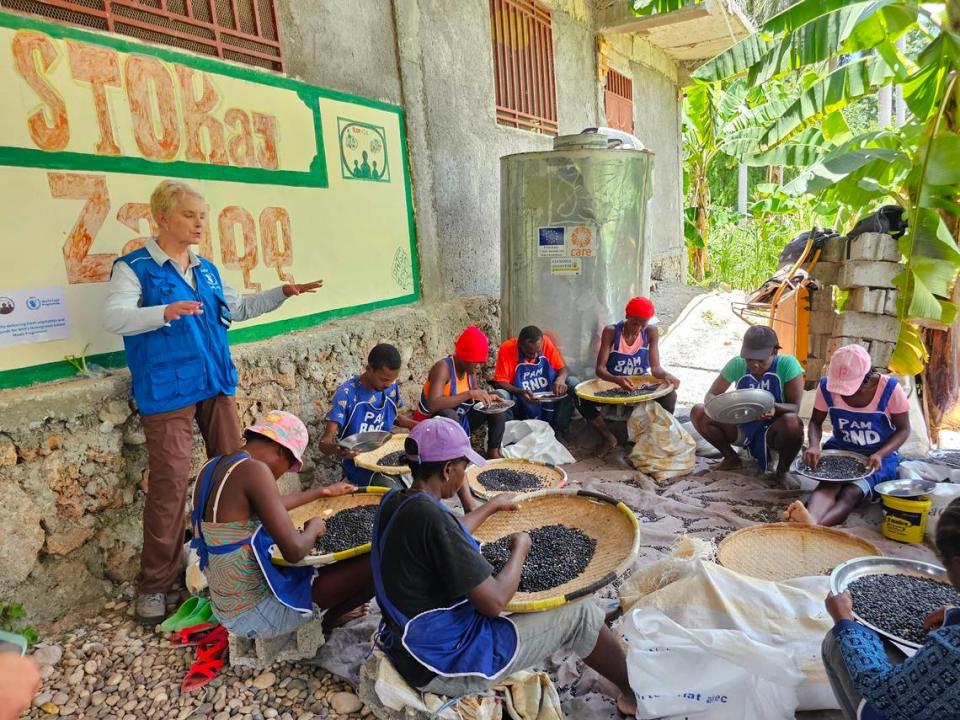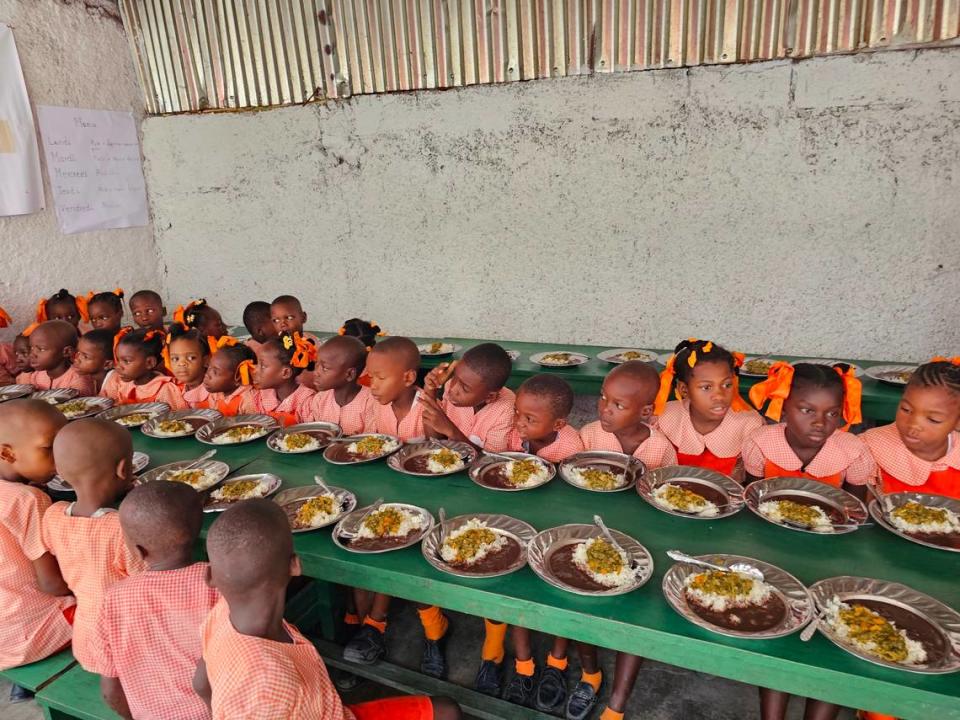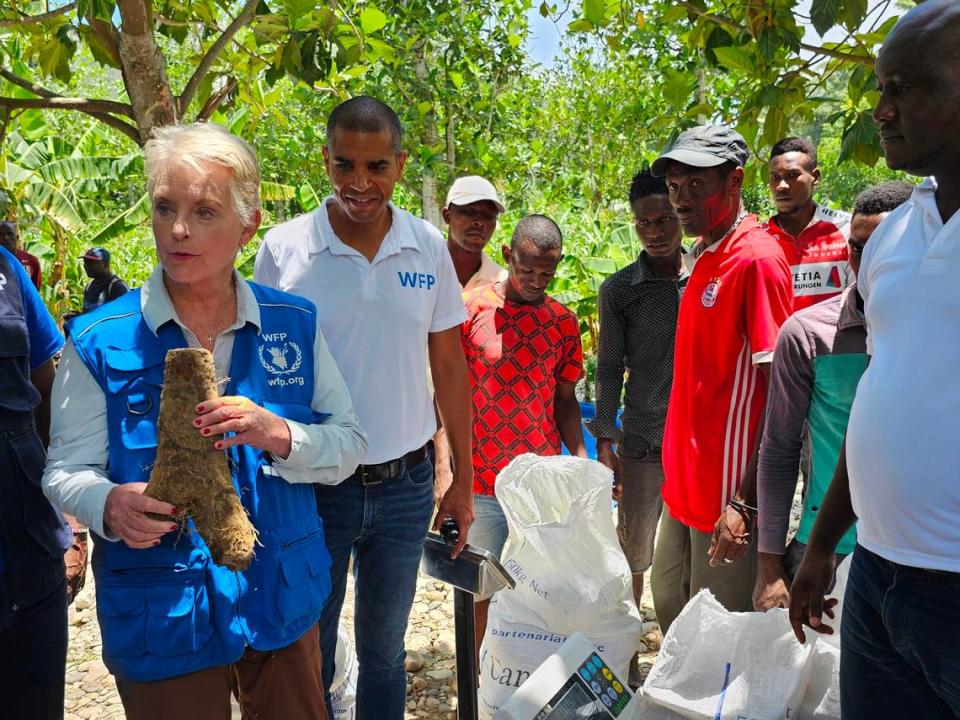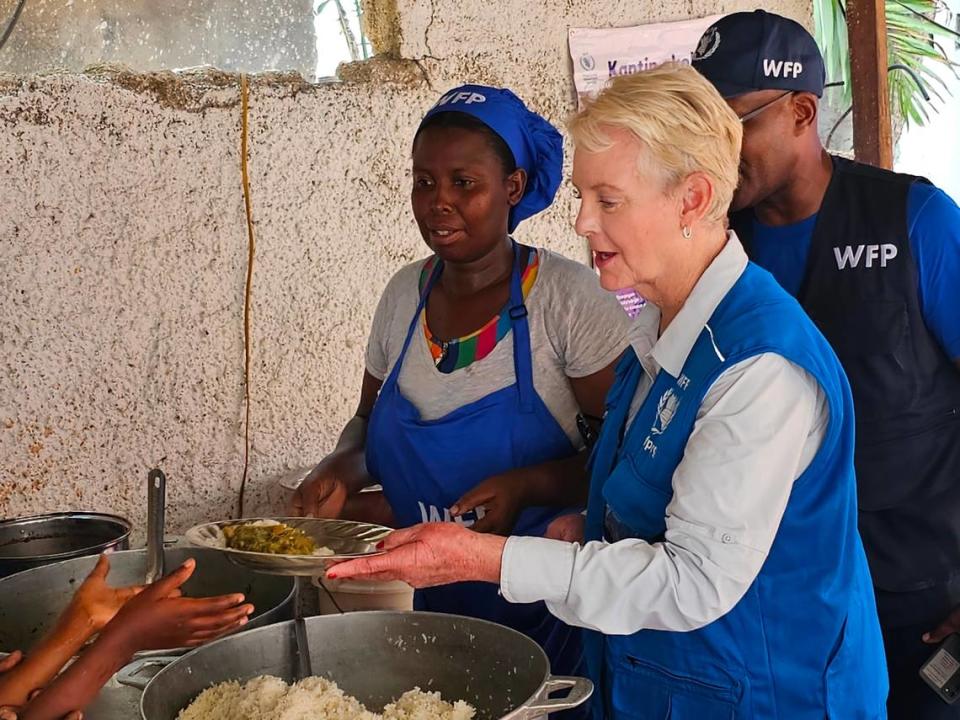As Haiti deals with hunger crisis, local crops, women may be key part of the solution
- Oops!Something went wrong.Please try again later.
Cindy McCain, the head of the United Nation World Food Program, was watching workers bag carrots, yam and other fresh vegetables in the backyard of a food processing center here, when she noticed a group of women sorting beans.
Making her way across the small rocky field in this southwest Haiti coastal city, McCain leaned back against a wall and quietly watched as the women, sitting in a circle, meticulously picked through the harvest of locally sourced dried black beans, removing small pieces of dirt, rocks and other foreign objects.
After a few minutes, a curious McCain, who was making her first visit to Haiti this week, turned to the head of the small farmers’ co-op and asked, “How much is produced?”
Caught off guard, Wisly Jasmin, who was giving McCain a tour of the operations run by the Réseaux des Organisations de Producteurs et Productrices de la Grand’Anse organization, turned to one of the farmers and asked the question in Creole.
“Five tons?” A surprised McCain remarked after receiving the answer from Jasmin, the deputy coordinator of the operation. Smiling, she clapped to show her delight.

“That is what this is all about,” she later said after hearing that 70% of the co-op participants are women. “Helping communities thrive.”
In a country on the brink of starvation, with nearly half of its population — including 3 million children — lacking enough food, McCain, the widow of late Arizona Sen. John McCain and the United Nations’ new food-aid chief, is trying to bring the world’s attention to Haiti.
She wants donors to know that Haiti is just one disaster away from catastrophe. U.N. aid agencies like the World Food Program are providing assistance in cities like Jérémie, which McCain toured this week as she sought to see for herself one of the world’s worst hunger crises..
“Right now I think that Haiti’s forgotten; certainly on the donor level and certainly within the international conversations that are going on about food security,” McCain told the Miami Herald. “And so I think it’s very important that I not only come here, but I raise the alarm bells about what’s going on here.”
Widespread hunger
Paralyzed by violent gangs, Haiti is grappling with one of its worst political and humanitarian crisis in recent history. Cholera is on a resurgence while the health system is near collapse. Schools are under attack, caught in the crossfires of kidnapping gangs that are using sexual violence to terrorize the population.
Of 5.2 million people in need of urgent humanitarian aid, 4.9 million are struggling to feed themselves. This includes 115,000 children under the age of 5 who are at risk of “wasting” away due to life-threatening malnutrition.
The proportion of Haitians facing emergency-level hunger is the second highest in the world per capita, McCain said as she met with mothers, local politicians and members of the diplomatic community during her two-day visit, which ended Tuesday.

The trip coincided with a visit by UNICEF Executive Director Catherine Russell and the U.N.’s new independent expert on human rights in Haiti, William O’Neill. Days earlier, Russell had warned that some 2 million Haitians now live in gang-controlled territories and many are chronically malnourished children.
Her comments came during a high-level U.N. crisis meeting in New York on Haiti. U.N. agency heads and Caribbean leaders warned that the humanitarian crisis is being compounded by the escalating violence, which has forced at least 165,000 people from their homes. They also lamented the fact that less than 23% of the $720 million the U.N. is seeking to support a humanitarian response plan has been funded.
McCain calls Haiti “a forgotten crisis,” pointing to the 1.8 million people seriously at risk of starvation, adding she believes a key to getting Haiti the needed attention is by “telling the story to the United Nations, to the United States Congress, to the other donors countries like Canada, Germany and the [European Union] and most of all encouraging our Caribbean nations.”

Still, the funding challenges remain. Despite its cash-based transfers via smartphones to vulnerable Haitians and partnership with local farmers to supply crops for its school feeding program, the World Food Program is itself struggling to raise $122 million over the next six months to reach 1 million Haitians.
“I’m finding it more difficult to raise money for Haiti because everyone just thinks that it’s either non-existent or, “Well, I can’t do anything anyway so why would I be here?” said McCain, accompanied by a dozen staffers including her Haiti director, Jean-Martin Bauer, and Latin America and the Caribbean regional director Lola Castro.
“I think it’s very important we remind everybody of the importance of making sure we are here in Haiti and we can be part of the rebuilding and the conversation and the resilience in making Haiti a better place,” she added.
As McCain traveled to different areas, the dusty view through the windshield of the armored SUV put the situation in perspective. Climate change, coupled with the effects of rising prices and the gang conflict, have left towns like Jérémie reeling. Large swaths of open farmland have been slammed by drought and, most recently, heavy rains. Buildings are in disrepair from recent disasters and the streets are teeming with unemployed people.
Hours away from gang-stricken Port-au-Prince, the city located in the Grand’Anse region of Haiti has seen a spike in its population as people flee the capital’s relentless gang violence, which has also left local farmers cut off from markets.
Earlier this month, the port city was struck by its second deadly earthquake in nearly two years. The tremor killed four people and happened days just after heavy floods had left at least 58 dead across Haiti. Both disasters have exacerbated the deepening political and economic turmoil, which has left local aid workers barely able to make ends meet.
‘When you nourish a child, you educate him’
Marie Lidy Joseph Azor, 42, an unemployed nurse and mother of three children, said the free school feeding program that the World Food Program sponsors has been an unexpected blessing.
She is among the families who fled to Jérémie to escape the violence in Port-au-Prince.
“When we know that the school is going to give a hot meal, we don’t have to worry,” she told McCain, explaining that without the assistance parents would need to come up with as much as $17 day to pay for their kid’s lunch. Now, “you know that the school is supporting your child in nutrition. It really is a good initiative.”
The feeding program, she said, allows parents like her to better stretch their measly resources.
“It’s not in vain,” Azor later said. “When you nourish a child, you educate him; there is a future for the country. There is hope.”

The visit with Azor at the Elim School was McCain’s first stop. Sitting under an aluminum awning, she sought feedback from parents and students about the hot meals, which usually consist of rice, beans and vegetables.
“If you could do anything different with the school feeding what would it be?” she asked, after a student thanked her for the program.
“The variety in the menu,” Evans Gilles, 11, said.
Still, Evans, who says he wants to be a soccer player when he grows up, insisted that the school feeding program has been a great comfort, giving him “energy” to get through his day.
After the encounter, McCain was invited to help serve lunch to the students. She scooped white rice into plates of black bean sauce with carrots and spinach, and then, smiling, handed the plates to the uniformed students as they filed into the outdoor lunch area.
While she enjoyed the school visit, she was most impressed, she said, by the food processing center with the farmers.
Jasmin, the director of the co-op, began the visit by showing off breadfruit, plantain chips and mango bread, all made from crops grown on local farms.
He then walked McCain through the warehouse where white sacks filled with rice were numbered and ready to be shipped to schools across the Grand’Anse region. Outside, more vegetables were being cleaned, processed and bagged.
That is when she came across the women cleaning the vegetables.
“We have very strong women who have decided that the important thing to do is not only feed their families but feed the community,” she said, adding that she strongly believes women “can be a solution” for communities in Haiti plagued by gang violence and hunger.
McCain acknowledged that security in Haiti is a challenge and said aid workers go to great lengths to not only get assistance to those who need it but to ensure that it doesn’t fall into the hands of gangs.
“That’s why feeding locally and depending on and encouraging people to grow their own food and selling it not only helps the economy but helps the community here and keeps it here,” she said. “That’s the most healthy for the people and certainly for the children.”
As Haiti continues to face uncertainty, there is one thing that she is sure of, McCain said: Quitting is not an option.
“If we were to stop everything here and say pull out, children would starve.”

